Let’s do a little exercise. I’ll read off a list of country names to you and you tell me the first thing that pops into your head.
Cambodia, Nicaragua, Tanzania, Afghanistan, Bangladesh, Bolivia, Republic of Congo, and Rwanda.
For most people the list is easy. War, poverty, despair, corruption, hopelessness, suffering. Most of the time you hear the names of these countries, it’s on the evening news, with yet more reports of awful news out of them.
But what if I were to tell you that after reading a few books, you can discover beauty, creativity, vibrancy, laughter, and hope in these countries? What if I told you that you and your children can experience what it’s like to watch sea turtles hatch on the beaches of Nicaragua, or swim with dolphins in Bangladesh, or run with elephants in Tarangire National Park in Tanzania? All without buying a single plane ticket?
Wouldn’t that be a lot better than the evening news?
In 2007, a man named Kevin McCaffrey read an article describing violence against women in Eastern Congo, and became incensed that absolutely nothing was being done to help them. Kevin traveled to Eastern Congo where he met with some of the women who survived the region’s horrific violence. They told their stories to him in the form of skits. During this time, Kevin was moved by their ability to communicate through storytelling.
Storytelling is something that’s universal to mankind. Every child in every country in the world wants Daddy or Mommy to sit by their bed and tell them a story at night. Every community keeps their history and their customs and their very culture alive through stories.
This sparked an idea which became Dot-to-Dot Children’s Books (www.dot-to-dot-books.org), a non-profit organization that helps people around the world use their creativity to help them strengthen their communities as well as raise awareness about important issues.
Dot-to-Dot recently released a set of children’s book under a series called “Endangered Species, Empowered Communities”. The books all focus on endangered animals in each of the countries mentioned above. What makes these books remarkable is that the stories were created and written by nearly 225 young women and children across the eight countries. So not only do you read the adventures of these animals, you also get an amazingly authentic portrayal of life in each of their countries.
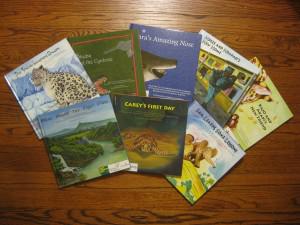
Each of the books is published by Dot-to-Dot Children’s Books in partnership with charities from each of the countries as well as the Wildlife Conservation Society, which works across all the countries to help preserve and protect endangered wildlife. I’ll give a brief description of each of the books.
The first book is called When Honey the Tiger Flew.
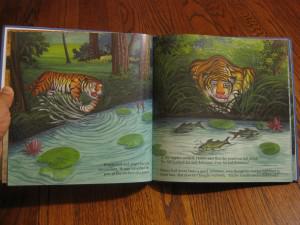
The book begins with a letter from one of the contributing authors of the book named Sina, intended for the parents or adults who are sharing the book with their children. The author’s name is Sina, and she describes how she was a victim of human trafficking from her native Vietnam to Cambodia at the age of 13, where she would suffer for many years. She was rescued by the charity Somaly Mam. Sina, in turn, has become the co-Director of a program in Somaly Mam called Voices for Change, a network of survivors of human trafficking that supports and empowers young woman and children who have been subjected to modern-day slavery.
The next page of the book has a picture of all 11 young women who helped co-author this book. All are members of Voices for Change. The book is a result of their learning about endangered tigers in their country and writing stories about the endangered Indochinese tigers. The combined the best of their stories to come up with When Honey the Tiger Flew.
The story is of a tiger named Honey who lived in the mountains of Cambodia. Facing more and more difficulty finding food to hunt, Honey decides to venture off to try to hunt food for him and his mother. He finally comes to a pond filled with fish. Does he figure out a way to catch a fish? I won’t ruin the ending for you

At the end of the book, there are two pages of facts about Indochinese Tigers with photographs. It’s an outstanding way to teach your kids about the kind of animal that they just got to know so well and encourage them to continue learning. There are also a few pages that let them learn about Cambodia, not only where it is on the map but also an illustration of what daily life there is like. Finally, the end of the book talks about the eleven remarkable women who helped write the story, including short biographies of each of them.
The next book is Carey’s First Day
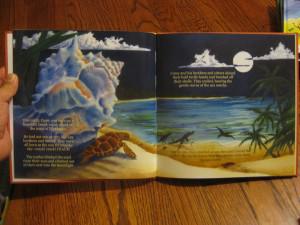
This story was written by 40 third and fourth graders in the small community of San Isidro de Bolas in Nicaragua. Looking at the pictures in front of the book, they look like any other smiling group of grade school kids. But what not apparent is that these kids are born into extreme poverty. The charity partner for this book is Fabretto Children’s Foundation, a non-profit that began when Father Rafael Maria Fabretto traveled from Italy to Nicaragua on a mission in 1948. When he saw Nicaraguan children living in poverty, he committed his life to changing their lives. Today, the organization continues to break the cycle of poverty for 10,000 children through education, nutrition, and community development.
This book was written by the school children about a sea turtle born on the coast of Nicaragua. They describe how Carey the turtle and his 149 brothers and sisters hatch and make their way to the sea. Carey is snatched by a sea bird before he can reach the sea. He escapes, but finds himself lost in the human world. He’s once again snatched by a little boy. Does Carey find his way back to the sea? Read the book and find out

The end of the book lists the names of all the kids who helped to write the story, and provides information about the endangered Hawksbill Sea Turtles, as well as information and illustrations about Nicaragua and daily life there.
The third book is called “Sam Learns Some Lessons”.
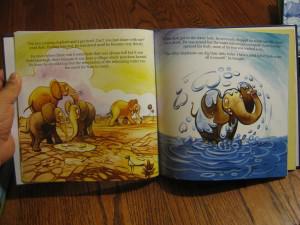
This book was written by 21 young women from Tanzania who are scholars in AfricAid’s Kisa Project, which provides the women with educational scholarships, leadership training, and mentoring. AfricAid itself is a nonprofit organization that has provided educational opportunities for thousands of students in dozens of schools across northern Tanzania.
The story is of elephants who roam the landscape of Tanzania’s Tarangire National Park. The herd is facing a drought and two brothers, Sam and Jamuu, are tasked to go find a wise elephant who knows where to find water. Sam is a mischievous elephant who is a bit selfish and self-centered, but he soon finds himself in trouble. With his brother’s help, he learns a valuable lesson about selfishness and love.
The book concludes, like the others, with two pages of photos and information about African Elephants, and provides information, a map, and an illustration of daily life in rural Tanzania. Finally, you can read the names and a short one-sentence bio of each of the 21 young women who helped author the book.
The fourth book is called The Snow Leopard’s Dream. This book was written by students at the Rokhshana Girls School in Kabul, Afghanistan under the auspices of Help the Afghan Children. Help the Afghan Children got its start when it established seventeen underground schools serving 425 girls during the time of Taliban rule when educating women was forbidden. Today, they provide education to over 23,000 students, and yet it can still be dangerous for girls to dare be educated.
The story is of a young girl who lives with her father in a remote area of Afghanistan at the base of a mountain. On top of the mountain lives a snow leopard. One night the girl has a dream where she encounters the snow leopard and saves it from a hunter’s trap. Later in the dream, the leopard returns the favor in a big way.
At the end of the book are two pages of photos and information about snow leopards, of which there are only a few thousand left due to hunting. There’s also a map and facts about Afghanistan, as well as an illustration of daily life in an Afghan farming community.
The fifth book is called “Shuba and the Cyclone”.
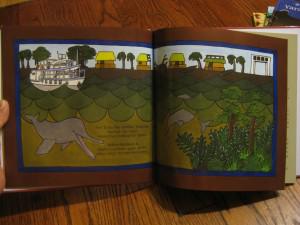
This book was authored by young women and children in Chandpai and Dhamrai, Bangladesh. The affiliated charity is BRAC, which helps overcome poverty, illiteracy, disease, and injustice in multiple countries around the world including Bangledesh.
This book is about a Ganges River Dolphin named Shuba. Shuba gets separated from her mother during a cyclone. As she tries to find her way back, she finds herself dealing with being alone, being caught in nets, and being threatened by a crocodile!
The book has photos and descriptions of the Ganges River Dolphins that live in South Asia. It also introduces us to Bangladesh and a view of typical life in a shrimp farming community.
The sixth book is Yara’s Amazing Nose, which takes place in Bolivia.
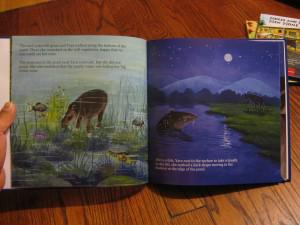
This book was written by twenty four girls from Bolivia who are Takana indigenous people. They are all from a remote region near Madidi National Park near the Amazon rainforest, so isolated that it can’t even be reached by car.
The book is about a Tapir named Yara who lives in the Amazon rainforest. She has to endure taunts from monkeys making fun of her big nose. She grows ashamed of her nose. But when a poacher’s trap ensnares a young helpless wolf, Yara saves the day, with help from her ample proboscis.
As with the other books, this one concludes with facts about lowland tapirs and facts about Bolivia and daily life there, as well as information about the partner charity Water for People, which since 1991 has helped save lives by helping local people understand about hygiene and helps them get reliable clean water and working toilets, preventing water-borne diseases.
The next book is Ndeze and Ndakasi’s New Home.
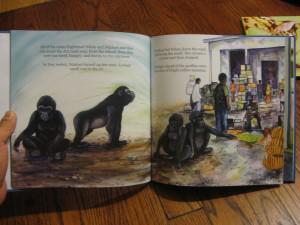
Students at the Tungane School and Muganga Primary School in the Democratic Republic of Congo wrote this book, with support from HEAL Africa, which has supported the children at the former school based in the hospital they run in Goma and at the latter school amid violent conflict, extreme poverty, persecution, and even a volcanic eruption. The story is about the eponymous two baby gorillas who were orphaned due to poachers. They get into some dramatic and hilarious adventures after they escape from Ranger Joe’s care, but finally return to safety. The end of the book talks about mountain gorillas, as well as life in the Republic of Congo, where among other things patients for the hospital have to travel hundreds of miles and people must carry heavy jugs of water to their homes just to have some clean water.
The last book is Kajo and Akari’s new Friend.
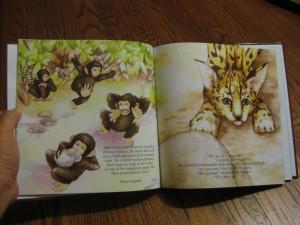
Moving over to Rwanda, we hear the story told by seventeen young women in western Rwanda, yet another area of the world where war, poverty and genocide have taken their toll especially on women and children. Women for Women International helped bring these women together to write a story about two chimpanzee brothers who befriend an unlikely animal. The book contains information about chimpanzees and information about Rwanda (did you know that Rwanda’s rich clay soil makes it perfect for making pottery?)
There are a couple things I really love about these books by Dot to Dot Children’s Books.
First, these books are the real deal. They’re not the product of some corporation after doing rounds of market research and focus group testing of kids. They’re simple, authentic stories written by locals who know their regions the best and who can understand the endangered species in their areas the deepest.
Second, unlike certain kinds of children’s books today, these don’t try to beat you over the head with a message. But when you hear the simple stories of animals written by young men and women who themselves are also facing their own set of challenges, you can’t help but be moved by both. It’s a great way to teach kids about how blessed they are, and of the responsibilities to help others that come with these blessings.
Third, you get to know about the culture and the way of life around the world. Again these are real people from real countries telling simple stories. And in doing so, both you and your kids and learn so much about their culture and their part of the world. The section at the end of the books which describes daily life in the countries is especially useful for getting kids–and yourself–genuinely interested in daily life around the world.
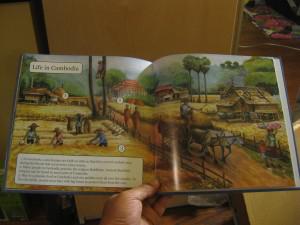
Fourth, the illustrations in each of these books is nothing short of phenomenal. Each illustration not only has brilliant colors and wonderful detail, it accurately reflects the environment and culture of the country where the book takes place, from the beautiful starlit beaches where the sea turtles are born to the snowy mountains of Afghanistan to the hot and arid landscape in Tanzania.
Fifth, these books manage to teach others lessons in addition to conservation ones. Like loving and forgiving your family as Sam the Elephant learned. Or remembering the important lessons of your mother as Shuba the dolphin did. And one of the most phenomenal lessons I personally learned is that despite all the cultural differences, there are certain things all humans have in common, regardless of economic status or nationality or language. We all love to laugh, we know we are stewards of the land, and we know that there is nothing more precious than love and that love really does conquer all. To me, those things are all what makes these children’s books phenomenal.

